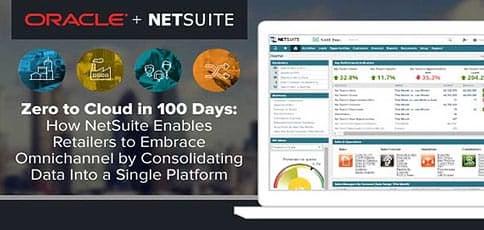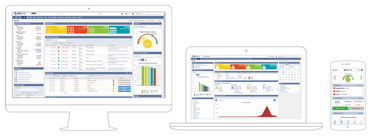
TL; DR: The digital transformation in retail is well underway, and many businesses with legacy architecture are in danger of being left behind. But NetSuite, acquired by Oracle in 2016, provides a path for retailers to consolidate all of their current systems into one cloud platform to capitalize on a future-focused omnichannel strategy. Through the SuiteSuccess process, a business can move all of its operations into the cloud in 100 days, realizing value and efficiency in months instead of years. NetSuite begins by unifying data and grows along with a company — as it’s built to scale from SMBs to enterprise. As omnichannel becomes the expectation, NetSuite enables businesses to move forward quickly and seamlessly.
The Duck Store has been serving University of Oregon students, faculty, and alumni for nearly a century, selling everything from food to apparel to course materials. It is even considered the second largest art supply store in the state of Oregon. But that history of success didn’t mean The Duck Store could continue with business as usual; it still needed to find ways to stay relevant in the modern retail environment.
The digital transformation seen in retail today reaches every level of business, and as consumers come to expect more digital services, companies that stick to legacy models can lose market share — or worse. In the face of heavy competition from industry giants, The Duck Store needed to reaffirm its place as a vital part of the university community and experience — or as the store puts it, “Ducks Serving Ducks.”
“We need to show customers that they are coming to the true campus community store,” said Alex Lyons, the Strategic Technology Team Leader for The Duck Store. “It became challenging to meet the needs of our customers given the antiquated architecture we were working on.”
The Duck Store chose NetSuite, provider of a suite of cloud-based financials, Enterprise Resource Planning (ERP), and omnichannel commerce software, to help consolidate legacy architecture and build a foundation for an omnichannel future. The Duck Store’s array of disconnected systems mirrored those of many retailers, especially ones that have diversified business models.
“When you look at The Duck Store, they are selling, renting, and buying books, but they also have other retail categories like apparel, accessories, and food,” Branden Jenkins, General Manager of Global Retail at NetSuite, told us. “Before NetSuite, there were multiple systems, manual processes, and legacy applications that made business complex. We provided a detailed path — beginning with consolidating those systems which creates a single source of customer, order, and inventory data — and now they have that unified commerce experience for their customers.”
The Duck Store quickly saw ROI online, as the NetSuite platform helped it reduce single-page bounce by 25% and see a 40% increase in pageviews per section. Branden tells us that those numbers can mostly be attributed to having quality data that is consistent in real time across all channels.
NetSuite, which was acquired by Oracle in 2016, is built for retailers to take their business to the cloud quickly and has created a path for businesses of all sizes to consolidate data and systems to accomplish that. The world of retail is undergoing some drastic changes, and brands that don’t adapt may lose market share.
SuiteSuccess Paves the Way for Digital Transformation in 100 Days
NetSuite helps businesses approach transformation in phases with the ultimate goal of having all of their data unified in the cloud in 100 days. The methodology of SuiteSuccess brings leading practices into the rollout so retailers can mitigate risk and complete implementations efficiently.
When systems become entangled and dated, it can be easy for a company to try to move at light speed to get them updated for new omnichannel features. But by taking a measured approach rather than trying to do everything all at once, a retailer can go live in parts to begin getting value sooner.
“We encourage customers to bite small and chew fast,” Branden said, “Those quick sprints lead to a smooth rollout and more value.”
Unifying Widespread Data into a Single Version of the Truth
The first step in the SuiteSuccess process is building a foundation through data conformity and unification. When a retailer has redundancies spread throughout its operation, efficiency can be completely lost.
“Order data can be found in a retailer’s e-commerce, order management, and ERP systems,” Branden said. “If that data is in more than one place, most likely one of them is wrong.”
NetSuite helps retailers parse that data down to what it calls a single version of the truth. By having one centralized data point that any system can access, the entire network runs more smoothly. Data unification allows for more digital flexibility moving forward.
“The first step to omnichannel is remediating the problem of data spread out,” Branden told us. “We consolidate the data in those systems and put them on a modern platform to enable that flexibility.”
Consolidating Legacy Systems to Address Modern Needs
When many retailers come to NetSuite, they often discuss front-end problems — like a decline in customer experience or inconsistent stock visibility across channels. Branden tells us that those front-end issues are caused by back-end problems.
“We help them focus on consolidating systems and channels into one version of the truth,” he said. “NetSuite is a single system to run your entire business from the back end — financial management, customer, supply chain — to the front office with POS, e-commerce, and email marketing.”

NetSuite’s platform gives retailers the ability to monitor their entire operation from any device.
As a company implements the SuiteSuccess plan, it enhances the back office with more automation and virtual intelligence for improved workflow, expanding the impact of NetSuite’s platform. Once a retailer has consolidated systems, a variety of experiences can be enabled — such as endless aisle, save the sale, online ordering for in-store pick-up, and ship-from-store.
And the entire operation can be viewed from a single dashboard on any device, giving a business owner real-time, actionable data. That updated information can be used for everything from pulling live inventory to evaluating individual store performance.
A Scalable Solution for SMBs and Enterprise Companies
NetSuite doesn’t just allow businesses to boost productivity and bottom lines; it grows with them. The platform is meant to scale from small business to enterprise and, in a departure from the norm, every NetSuite client is running an identical version of the software.
“All of our customers are on the same version,” Branden told us, “and that is a major shift from the typical systems that they have deployed in the past, which are on-premise or have many customizations.”

Branden Jenkins, General Manager of Global Retail at NetSuite, spoke to us about the platform’s power.
NetSuite’s cloud-based platform is highly customizable with all of the extras that any company wants, but they are all working from the same unified base, which simplifies the process of adding functionalities.
Scalability matters because as channels begin to grow, it can put a strain on systems that aren’t built with that kind of growth in mind. The virtually endless nature of the cloud gives NetSuite users the security of knowing that they can’t max out the technology. But beyond scalability and consolidation, NetSuite provides peace of mind to retailers who fear they will be left behind by newer systems, processes, and best practices.
“The cloud automatically — or as we like to say, automagically — updates with new features,” Branden said. “So, our clients can get on our platform, not get left behind, and really address the transformation that is happening in retail.”
NetSuite’s Platform is Designed for The Retail Transformation
The Duck Store was proactive about digital transformation, and after following NetSuite’s omnichannel path, the campus book store can compete with larger competitors for market share by being more responsive to customers.
When retailers chase new technologies to solve problems in each model of their business, they can cause what Branden refers to as a hairball — which is a mess of strategies and software. The path to purchase then becomes convoluted and the consumer journey fragmented.
NetSuite helps retailers take a step back, get all of those systems and technologies on the same page, and build around the customer experience on a single, solid platform.
“Retailers are becoming manufacturers, distributors, and even subscription services on a global scale,” Branden told us, “and NetSuite is there to help them scale up at every step.”
HostingAdvice.com is a free online resource that offers valuable content and comparison services to users. To keep this resource 100% free, we receive compensation from many of the offers listed on the site. Along with key review factors, this compensation may impact how and where products appear across the site (including, for example, the order in which they appear). HostingAdvice.com does not include the entire universe of available offers. Editorial opinions expressed on the site are strictly our own and are not provided, endorsed, or approved by advertisers.
Our site is committed to publishing independent, accurate content guided by strict editorial guidelines. Before articles and reviews are published on our site, they undergo a thorough review process performed by a team of independent editors and subject-matter experts to ensure the content’s accuracy, timeliness, and impartiality. Our editorial team is separate and independent of our site’s advertisers, and the opinions they express on our site are their own. To read more about our team members and their editorial backgrounds, please visit our site’s About page.

